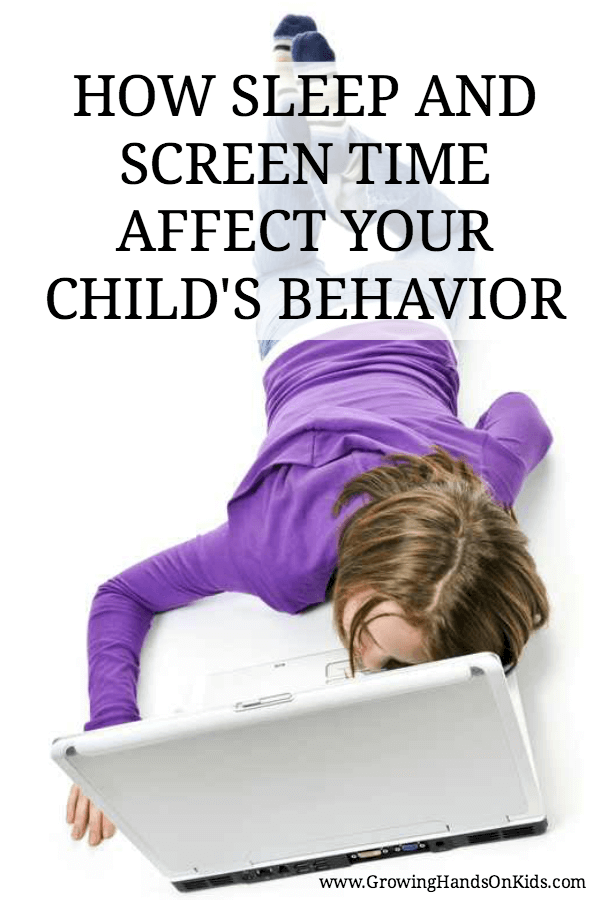How Screen Time and Sleep Affect Your Child’s Behavior
Affiliate and Referral links are used below to promote products I love and recommend. I receive a commission on any purchases made through these links. Please see my disclosure policy for more details. As an Amazon Associate, I earn from qualifying purchases.
I hope you have been learning a lot and enjoying the behavior vs. sensory series I have been doing this month. Today we are looking at screen time and sleep and how that affects your child's behaviors.
How Screen Time Affects Behavior
We live in the digital age! TV, video games, computers, iPads, iPhones, smartphones, and all the other screen devices out there are grabbing our attention. Children now have access to technology at a much younger age than most of us adults!
Growing up, I did not have my first cell phone until I was driving, at 18 years old. And it wasn't one of those fancy smartphones of course. It was a black and white text and phone calls only a phone. We didn't have a computer in our home until I was 16 or 17 I believe. Our first computer was one of the old DOS computers. It was a huge day when we got an actual desktop with Windows! A whole new world opened up for us.
Did you know that the average American child watches 3-4 hours of TV a day? (source) And that isn't even including video games, phones, iPads, or computers! Another report stated that the average child is exposed to 50 hours of screen time in one week!
The American Academy of Pediatrics recommends little to no screen time for children under the age of 2. For ages 2 and above they recommend no more than 1-2 hours a day. (Source) So why is too much screen time so bad for our kids? Here is a list of reasons why:
- An aroused nervous system (which makes falling asleep difficult)
- Sensory overload
- Lack of restorative sleep
- Lack of movement (leading to increase obesity rates)
- Exposure to violence
- Atrophy in gray brain matter (where processing occurs in the brain)
- Addictive tendencies (due to dopamine being released in the system, a hormone that simulates reward processing in the brain and addictions)
- Impaired brain function (decrease in impulse control, abnormal brain activity which leads to poor task performance)
(Sources: Psychology Today; Iowa State University; C|Net; Mayo Clinic)
When your child has too much screen time, their entire mood and behavior are changed! Their brain can actually be damaged from too much screen time.
So how does sleep fit into this?
How Sleep Affects Behavior
When your child has too much screen time, in particular, right before bedtime, their body is put into an unnatural state of arousal. This makes it difficult for them to fall asleep. When they do eventually fall asleep, their body does not fall into a normal sleep pattern. Because their body is still un-naturally aroused, even in their sleep, they never enter the 4th stage of sleep which is the deepest and most restful sleep.
When their bodies are not fulling rested, their body gets stressed. Remember when we talked about how our bodies react when they are stressed? They react with a fight or flight response. Environments or situations that wouldn't normally bother them, all of a sudden do because their body is trying to deal with the stress of not sleeping, plus dealing with being un-naturally aroused from the screen time!
It turns into a terrible cycle.
The best example I have of lack of sleep was from being a first-time mom. My daughter was a terribly colicky baby, from what we found out later was most likely reflux issues. Her body was in a constant state of stress it seemed, which meant lack of sleep for both of us. The first 6 months were honestly a blur. All I remember is not being able to sleep, but somehow managing to survive.
Lack of sleep puts all of us on edge. I can definitely tell that being on the computer or watching tv right before bed makes it difficult for me to fall asleep. When I don't get that restful sleep, I am a “bear” the next morning. Little things that my daughter does, that don't normally push my buttons all of a sudden bother me. I find myself tolerating less and also being more cross and using a raised voice.
So now imagine how your child feels, who may already be dealing with sensory processing problems. Add in the screen time, which affects the sleeping patterns, which affects an already not functioning sensory processing system and you are getting nowhere fast.
What to do About Screen Time And Sleep
It is obviously very hard to completely avoid screen time! But here are some easy tips you can use in your home to help:
- Remove all screens and electronic devices from your child's bedroom (the bedroom should be a place to relax and wind down, no screens allowed)
- Do not allow screen time for at least 1-2 hours before bedtime (this gives the brain a chance to come down out of that unnatural state of arousal and allows your child to relax before bed)
- Limit screen time to the recommended 1-2 hours a day (or even less) for children 2 years old and older
- Very limited to NO screen time for children under 2 years old (I realize this is not always practical, I struggle with this in our home as well. You are not alone, so don't feel like I am bashing you for letting your toddler watch TV).
- Encourage physical activity and playtime away from computer or TV screens
- Encourage reading before bed
- Have a consistent bedtime routine and time (in our home we get into PJ's, brush teeth, read a few stories, pray, and then I rock her for about 5 minutes while singing a few songs. Then I place her in the crib and typically she is asleep within half an hour or so. Bedtime is as close to 8:00 pm as we can get each night. We started this routine at birth).
*Note: Many children with sensory processing disorders can also have sleep disturbances. If you feel your child may have a sleeping disorder, please consult your physician and see about having a sleep study or other tests done to rule out any of these issues.
I also highly recommend this series by my friend Heather at Cultivating Lives:
You can find the other posts in this series below:
- Is it Behavior? Or is it Sensory?
- The Vestibular System
- Diet & Nutrition
- Sleep & Screen Time
- Problem Solving Discipline & Sensory Processing
Want a Printable Version of This Behavior vs. Sensory Series?
I have a printable version of the entire 5 post series that you can download when you subscribe below. Just enter your e-mail address and click the “Subscribe to Download” button. You will need to confirm your subscription in the e-mail you receive in your inbox (double check your spam box if it does not show up in your inbox).
Once you have confirmed, your printable will automatically be downloaded to your computer. Double-check your “downloads folder” to find it and save it to your computer for future reference!
For more tips and ideas you can come check out my Pinterest boards:
Follow Heather @ Golden Reflections Blog's board Occupational Therapy Tips on Pinterest.
Follow Heather @ Golden Reflections Blog's board OT Tips from GRB on Pinterest.

Heather Greutman, COTA
Heather Greutman is a Certified Occupational Therapy Assistant with experience in school-based OT services for preschool through high school. She uses her background to share child development tips, tools, and strategies for parents, educators, and therapists. She is the author of many ebooks, including The Basics of Fine Motor Skills, The Basics of Pre-Writing Skills, and co-author of Sensory Processing Explained: A Handbook for Parents and Educators.


Hi
I’m really enjoying reading this series. Thankyou.
I’m not in agreement with the 2 hours screen limit though. The report that you mention has been reviewed and was found to be based on passive TV screen time. If it’s the one I’m thinking of, ipads etc weren’t even around when the study was done.
There is something significantly different between passive viewing and screen use that involves games, communication with others and more “active” involvement.
Passive watching is not really encouraged in my house, I do have strong limits on that. I also notice that one child needs a lot more down time and no screens before bed than my other one does in order to have a good nights sleep.
I think the research needs to catch up when it comes to other screen usage. This generation is the first to have been born into a world where the internet has always existed. From watching and talking to my son (he’s 12 and the spectrum) I’ve learned a lot to challenge my prejudices around screen time. Its not going away, its not inherantly “bad’ and some people on the spectrum, like with HF Aspergers actually need to go into a different world to recover after social interaction at school…and games like Zelda, minecraft and others that demand attention and interaction can do just that.
I’m 100% in agreement with the idea that we need to ensure they have body movement and interaction with nature too. (I’m a runner so feel quite passionately about health in our house)
I guess I’d like to see research approach screens with more of a open mind about what modern life looks like these days and how it’s not so black and white.
Cara
Hi Cara,
You definitely bring up some good points. I know that there were recently some updated screen time recommendations at the end of last year that talked about active screen time vs. passive screen time. I know for my own daughter, I’m much more open to her watching signing time videos or something that she is actually interacting with. Thanks for sharing your perspective!
How do you limit screen time when it’s a necessity for homework. My high schooler has SPD. Homework has always been a struggle…when she started hs this year we cut back in her 504 knowing that hw is a requirement of ap and honors courses. Sometimes she’s up until10:00 -11:00 doing hw and sleep has been an issue since the 3rd week of school.
Thank you for sharing. This is great! this why at getScreen.com we have a default nighttime rule to make sure no devices are available when it’s time for bed 🙂
This is a great series, Heather! I’m just reading it now and am so excited to share it with a class full of teachers that I am instructing about “OT issues in the classroom”. Your posts make it easy to understand! Will share on my Miss Jaime OT FB page for sure! Thanks!
Thanks so much Jamie! Means so much coming from a fellow OT. 🙂
We totally think that this is important in our household!
We’re looking at this company called Appiom to help block wifi/data, since our older kids can be sneaky!
Thanks for the tips.
I’d love to read these articles but the Build Your Bundle ad keeps popping up and blocking hte text! Can you send the series to me?
I’d really appreciate it.
Thanks
Joy, there is an “x” at the top of the pop-up screen that you can click to x out of it. Let me know if that does not work.
We try to limit screen time. It is hard, the kids really want to watch their shows…we found turning on Pandora is a good alternative. We listen to kiddie radio and everyone is happy, and free to do things like dance, play games, draw or play with legos- instead of just sitting around.
“A Day Well Spent Brings Happy Sleep.”
Thank you for stopping by the Thoughtful Spot Weekly Blog Hop this week. We hope to see you drop by our neck of the woods next week!
I absolutely agree with everything you say. I wonder what impact so much exposure to screen will have long term. We followed “no screen under 2” policy and even now limit our 7 year old’s screen time drastically. Unfortunately, she does use it in the evening, because there is no better time for it, and I do see that it takes her longer to fall asleep. I still have to figure out how to deal with that problem!